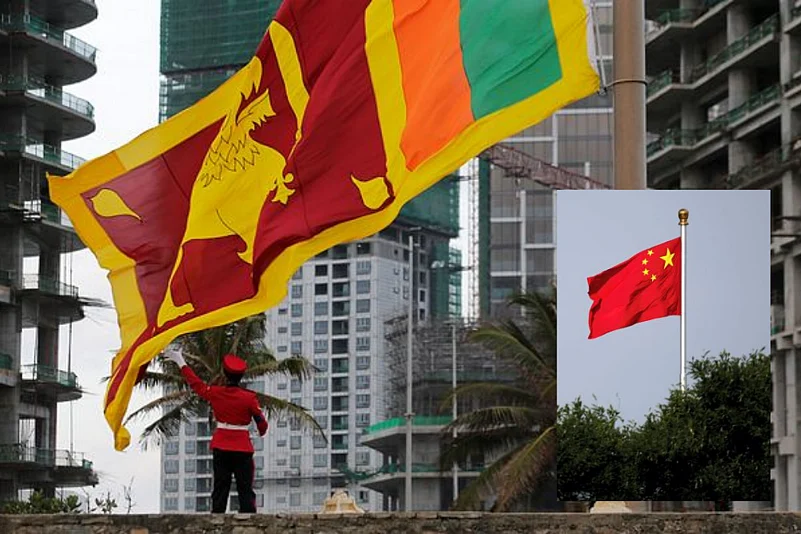Sri Lanka and China are having a proper royal commercial spat, despite both countries having excellent political ties. Some analysts in India, smarting from what they perceive as the Gotabaya brothers’ close ties with Beijing are hoping that the ongoing differences will lead to souring of ties between the two. However that is wishful thinking as the stakes are too high for either Colombo or Beijing to let a single commercial deal ruin the overall strategic interests. But for now, tempers are high on both sides.
The problem arose after a Chinese company, Qingdao Seawin Biotech Co Ltd, supplied contaminated organic fertilizers to Lankan farmers. Colombo rejected the consignment on the grounds that the samples contained a deadly bacteria called Erwinia which destroys crops. The Chinese company in its turn has denied sending contaminated fertilisers and spelt out the production process. The company claimed that it uses organic raw materials, amino acids, humic acid, seaweed and clay for fertiliser, which is then roller double dried at a temperature of 600 degrees centigrade. This is exported not just to Sri Lanka, but to fifty other countries including the US, Germany, Spain, Italy, Australia and New Zealand. Qingdao Seawin Biotech has a huge and loyal customer base both in China and across the world.
Through its lawyers, the Chinese company has threatened legal action against the department. It has now demanded $8 million from W.A.R.T.Wickramaarachchi, the additional director of the National Plant Quarantine Services, as compensation for wrongful charges and damage to its international reputation.
Earlier China had blacklisted Sri Lanka’s People’s Bank for non-payment of the damaged consignment. The payment was stopped as the Court ruled that the bank must not pay for the damaged fertiliser shipment. The Chinese were furious. Its envoy in Colombo sought the intervention of Prime Minister Mahinda Rajapaksa, who however maintained that he expected China to take care of quality control. The PM also said that the government could not move against a court order.
Prime Minister Mahinda Rajapaksa while he was president, especially during his second term was seen tilting towards China and sent alarm bells ringing in New Delhi. Rajapaksa was a hero for most Sinhalese as it was during his term that the Liberation Tigers of Tamil Eelam were wiped out. However, there were allegations of widespread human rights violation by the Sri Lankan army during the last days of the military campaign. India together with the US and UK passed resolutions at the UN against Colombo. In 2008, two Chinese submarines were allowed to dock in Colombo harbour. This shook the Indian establishment, as China has been steadily cultivating each of India’s neighbours. Relations between the two countries plummeted. However, both Delhi and Colombo realised the folly of working against each other. Ties have been repaired. Colombo has clearly said that it would always keep in mind India’s strategic interests. Today India-Sri Lanka ties are excellent. Yet China with its major commercial investments, including the construction of the Colombo port city at the cost of $1.4 billion is, one of the largest foreign investments in the island state. China also has a 99-year lease on the Hambantota port basically because Sri Lanka was not in a position to repay its debt and was forced to allow China to handle Hambantota.
Apart from its commercial interests, China is keen to ensure that its ties with Sri Lanka, a stone’s throw from the Indian mainland, remain solid. China which is expanding its presence across the Indian Ocean is making certain that its relations with island nations in the region continue to flourish.
The angry exchanges between the Lankan and Chinese officials have come at a time when Sri Lanka is suffering from a massive food crisis. This was triggered by President Rajapaksa’s decision to announce earlier this year that the island nation would no longer use chemical fertilisers. The idea is excellent, but this sudden announcement without adequate preparations had led to massive unrest among farmers and a huge loss to the tea industry. There was a scramble to get organic fertilisers, but the ordinary rice cultivator had a major problem as he did not have the means to get the more expensive organic fertiliser. The government could not assure adequate supplies of organic fertilisers either. There was unrest across the island. Finally better sense prevailed and the order to go completely organic was changed.
How the case against the Lankan agriculture department pans out remains to be seen and whether Colombo pays up the $8 million demanded by the Chinese.



















